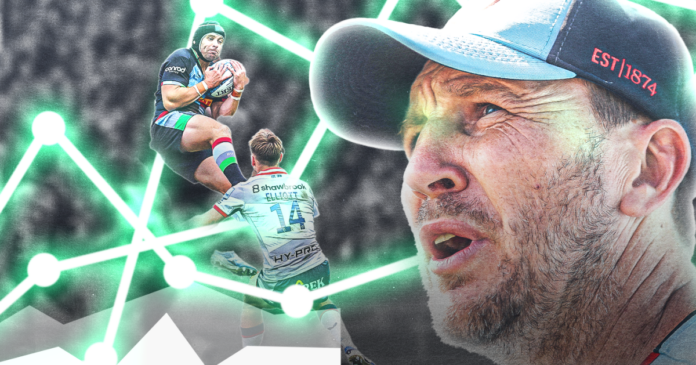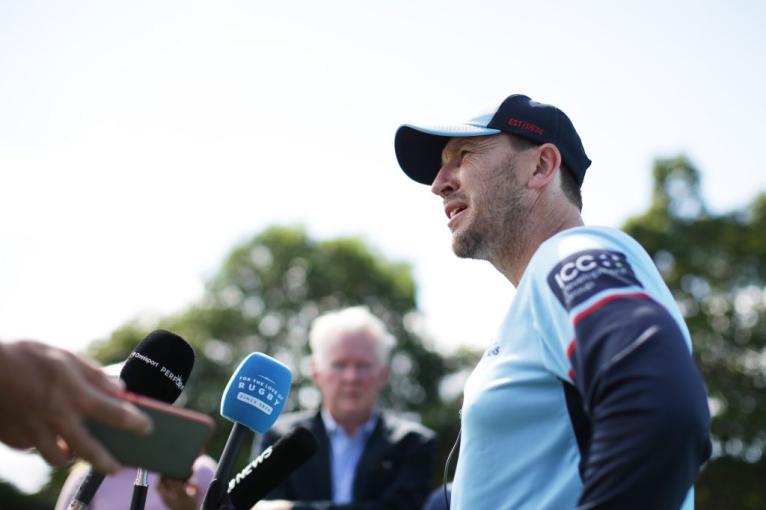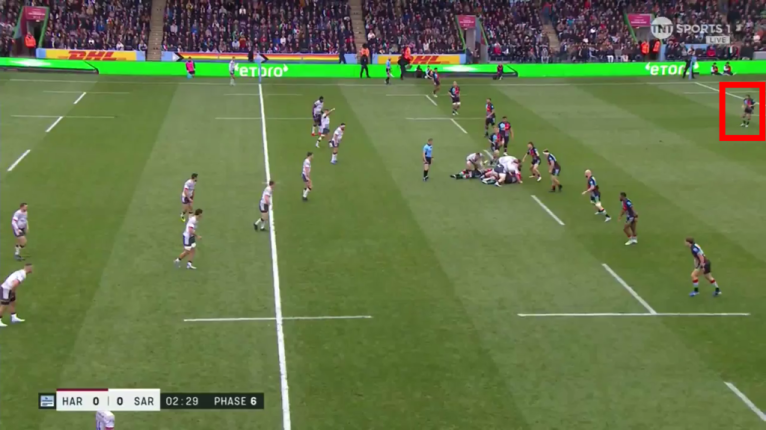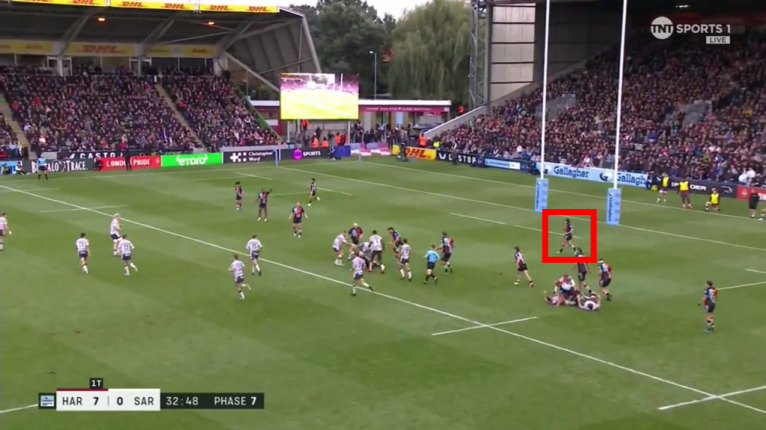
[ad_1]
Speak it in a whisper, but the case for the defence in Australian rugby is not yet done. It may even be spluttering back into life, albeit in a league halfway across the globe.
After a dismal Rugby Championship performance where the Wallabies conceded a grand total of 28 tries in their six games, including one loss in Santa Fe where they gave up nine, the body was no longer twitching and the rugby paramedics had given up the ghost. They were ready to pronounce a time of death.
The signs of a revival have ignited in London and the Midlands in the English Premiership, and the key witnesses to it are Michael Cheika and Jason Gilmore, currently plying their trade with Leicester and Harlequins respectively. After four rounds of the season, Tigers and Quins lead the way, ranking first and second in the league.
Michael Cheika has steered Leicester to victory in three of their opening four Gallagher Premiership matches (Photo by Dan Mullan/Getty Images)
The Welford Road club has only given up seven tries in four matches at a paltry rate of less than two per game, and the men from the Stoop have only conceded one more. Ex-Wallaby supremo Cheika is the new head coach at Leicester and Gilmore is the new defensive face at Quins, drafted in after the off-season departures of Jerry Flannery and Jordan Turner-Hall.
After laying down an early lifetime marker as coach of the generationally-talented Junior Wallabies squad which finished runners-up at the 2019 Under 20 World Championship, and beat the Junior All Blacks to win the Oceania Championship, Gilmore’s career had stuttered uncomfortably at the Waratahs. His stint in New South Wales as first assistant, and then interim head coach after Rob Penney’s abrupt sacking in 2021, never looked stable, and the Sky Blues’ perennial weakness on defence never really improved.
‘Travel, and a change of place imparts new vigour to the mind’ according to the Roman Stoic philosopher Seneca, and that certainly has been true for Gilmore, whose coaching flame has been rekindled since waving goodbye to Sydney. That sense of new impetus has been amply attested by Harlequins’ head honcho Danny Wilson, whose most urgent mission was to rebalance a club committed to attack at all costs, but much more diffident about defence.
After a narrow 12-11 loss at Sale Sharks in the first round, in which Quins conceded four penalties but no tries, Wilson could already feel the difference.
 Jason Gilmore swapped New South Wales for London in moving from the Waratahs to Harlequins for the new Premiership season (Photo by Matt King/Getty Images)
Jason Gilmore swapped New South Wales for London in moving from the Waratahs to Harlequins for the new Premiership season (Photo by Matt King/Getty Images)
“The thing that stands out is [Jason’s] on-field coaching. As a coach you have on-field coaching, what we call coaching in the red, where you are fault-correcting on the run, at high speed, with things happening in front of you.
“Then you need the skill-set of a coach who is analysing that on the video and giving feedback afterwards. Jason’s ‘in-the-red’ coaching is excellent, he sees things on the field [in real time], and can make corrections as opposed having to look at the video afterwards.
“He has given the boys clarity about the system. ‘This is the way we are going to defend’ and if they ask a question, he has the answer. It is all you can ask for, making sure you have that clarity in the system. I have been impressed with him and what he is building.
“It is not drastic, there are just some slight additions but most importantly there is real clarity, there is no ambiguity about what the system is.”
The views of the head man were supported by those of one of Quins’ top players, number eight Alex Dombrandt.
“The big work-on has been our defence. ‘Gilly’ has been brilliant. He’s brought that clarity and detail, and the boys have responded really well.
“The most exciting thing is we’re only just scratching the surface, so we can really get after it. It’s exciting to see how far we can take it.”
🚨 LEIGH HALFPENNY HAS A #GallagherPrem TRY 🚨
The Wales legend goes over for the first time for @Harlequins 👏#GallagherPrem | #HARvNEW pic.twitter.com/4yje8mTIdP
— Rugby on TNT Sports (@rugbyontnt) September 28, 2024
Ahead of the new season, the Stoop club added former Wales and British and Irish Lions full-back Leigh Halfpenny to their squad at the venerable age of 35. After pen was put to paper Wilson commented “[Leigh’s] experience speaks for itself and he will bring plenty of leadership, expertise and high standards to our squad”.
The most fascinating aspect of the trade was Halfpenny is the complete antithesis as a full-back to the incumbent Tyrone Green, who has been mentioned in dispatches as a prospective 15 for England and South Africa. Green’s main point of difference is as a counter-attacker, while Halfpenny is a defensive expert.
Around 10 years ago, the Welshman was indisputably the premier defensive full-back in the northern hemisphere, and one of the best two in the world along with New Zealand’s Ben Smith. He was a ‘general from the backfield’ for defensive guru Shaun Edwards, and his movement and ability to read the game marked him out as special player. More often than not, it enabled Edwards to add an extra body to the line and leave the backfield duties to Halfpenny alone, when most sides need at least two or three players manning that space. The Gorseinon native was that good.
The presence of Halfpenny at the back has given Gilmore the wherewithal to ‘shut the gate’ on wide attacks far more quickly than the Wallabies ever managed in the Rugby Championship, and the Welshman has formed a very productive relationship with young English wunderkind Marcus Smith in the process.
In the last Premiership derby fixture, Harlequins faced their North London nemesis Saracens, who had won the past eight matches between the two teams. The Barnet-based club scored the most points of any team last season [471 at an average of 30 per game] and were likely to prove the most stringent test of Gilmore’s defensive improvements, and Halfpenny’s backfield expertise, to date.
The probing for weaknesses began immediately.

At the start of the play, Halfpenny is defending beyond the right 15m line, but within 10 seconds he is in position to defuse the kick through, and that in turn allows Smith to come up earlier on the left edge to smother the width of the field. At the finish, Smith has recovered to re-ruck over the top of the Welshman and consolidate the turnover.
In the second period, Halfpenny repaid the compliment.
On this occasion, he is up on the edge and Smith is in the backfield behind him, and some neat footwork by the England 10 is supported by the Welsh full-back’s urgency on the reload and re-ruck to win the ball.
The mobility of the Quins’ backfield was a constant thorn in the side of Saracens’ efforts to create overlaps on one side of the field or the other.

This is a very different picture to what was happening in so many of the Wallabies’ matches in the Rugby Championship. Halfpenny starts on the left half of the field but by the end of the following phase he has worked all the way over to the right so Quins can blanket the width to that side.
The new brotherhood of ‘Marcus and Leigh’ kept on winning the race to the corner in the second period, even at positions deep in their own red zone.
Smith circles around the first ruck in midfield and shifts all the way out on to Elliot Daly on the following phase. Both he and Halfpenny maintain perfect alignment on the last two Saracens attackers, Daly and rookie sensation Tobias Elliott to shut down the play.
It took the visitors until the 48th minute to register their first points on the scoreboard, but by that stage Harlequins had won all the battles that really mattered, and the sense of the visitors’ discouragement was palpable.
Even when Saracens finally found their pot of gold at the end of the rainbow out wide in that second instance, almost inevitably the last two Quins defenders [left wing Cadan Murley and Halfpenny] get back to put out the flames before boiling point is ever reached.
If Joe Schmidt does ever decide he needs a specialist defence coach for his Wallabies, he could do a lot worse than make a phone call to Gilmore. They say a change is as good as a rest and the new setting has brought the Queenslander back to life as a teacher and mentor.
He knows his work is appreciated at a club whose traditional preference has always been on the other side of the ball. With help of Halfpenny’s arrival at the Stoop, Gilmore has been able to ‘shut the gate’ on wide attacks far more effectively than the Wallabies. ‘Offence sells tickets but defence wins championships’, and Gilmore may just be the missing piece of the coaching jigsaw Schmidt needs for Australia to compete at the 2027 Rugby World Cup.
[ad_2]
Copyright for syndicated content belongs to the linked Source link


